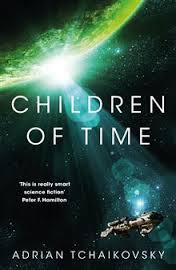Children of Time vignette 5: Voyage to Nowhere
Meet Vrie Guyen: your life in his hands.
You wake in darkness, enclosed. Something is forcing its way into your mouth, down your throat. Something is clamped about your nose. Things are invading you. You fight; you can’t fight: you are restrained. Then something gives; your arm clutches towards your face but strikes a cold, hard surface right before you… above you… you cannot tell. You cannot tell which way is up.
Your hand slithers up the inside of the cold surface until it is at your mouth. Tubes, there are tubes. You wrench them out. You stare into the darkness until the lights come on.
They are soft lights, originating from somewhere behind your head. Probably they are intended to be comforting. You are not comforted.
The barrier before you is clear. Looking out of it you see… ranks of clear-fronted coffins in a great dark space. At first you think they are reflections, but all the others of you are asleep, their tubes still plugged into nose and mouth.
You have no idea where you are. You yell. You bang at the clear plastic. It is colder than it was.
There is a voice, a man’s voice.
“Can you hear me?” it says.
You listen. It repeats itself. The voice sounds patient, sad.
“Yes,” you whisper into the tiny coffin that is your world. “I hear you. Who are you?”
“Do you know where you are?” asks the voice, leaving you uncertain whether it’s owner can hear you.
You open your mouth to say, and there is a hole in your mind, a great yawning gulf where the knowledge should be. You do not know where you are. You do not know who you are. Your sense of self is a string of disjointed images: the sun, parents, a brown landscape, the harsh taste of the air.
“Listen to me,” says the voice. “You are on the Gilgamesh. The Gilgamesh is a colony ship. Do you remember.”
You know the name, but it’s like someone you met a long time ago. You can’t place it. You try to understand what the voice means. A colony ship…?
The voice continues with its dreadful, didactic patience. “The Gilgamesh is on a journey to another world, do you understand that?”
And you do. When the information abruptly flowers in your mind you feel like weeping. You are coming back to yourself. You are more than these broken fragments. “Yes,” you say, and “Yes!”
“We have star maps from the Old Empire,” the voice confides to you – things you think you knew once, fitting into place like bricks, one on another. “We are humanity, in this ship. We are on a long journey to a planet that we believe the ancients made into another Earth. But an unspoiled Earth, one not poisoned by their war.” There is a terrible, wistful yearning in that voice.
“Who are you?” you demand. If not for that yearning you might have taken it for some thinking computer, such as the ancients were supposed to have.
“My name is Vrie Guyen. I am the Gilgamesh’s commander. Right now I’m the only member of Key Crew not in suspension. You and I are the only two human beings awake.”
And you think about that, and you know it must be an honour that they’ve woken you first. You and the commander, of all those sleeping people outside your coffin. “Commander,” you say, “how long before we’re on this new Earth?”
Guyen’s voice says nothing for long time.
“Commander?” you prompt him, and then again. And then again.
“If it is there,” says Guyen’s disembodied voice, “then the Gilgamesh will reach it in approximately twelve-hundred years. Our ships cannot travel as the ancients travelled. We have only a shadow of their technology, their resources…'
You do not understand. Guyen does not volunteer an explanation. You cannot even think of how to phrase the question. The silence stretches out, and it’s getting colder.
“You see,” the commander tells you eventually, after listening to your teeth chatter, “you are the first.”
“The first to wake.” You can barely get out the words.
“The first cargo malfunction,” Guyen tells you. The words mean nothing. You turn them over in your mind. Still nothing. Then, as though a visual illusion has just flipped before your eyes, you understand.
“We knew this would happen with a proportion of the cargo over the time periods involved,” Guyen goes on, and you wish he would just shut up but you have no way to make him. “I had the Gilgamesh wake me, when it did. You are the first. I felt I owed it to you.” And, perhaps because his voice is all you have, you can hear the ragged edges there: the man who is responsible for everything.
You try to say something. Guyen will never know what your final message to him would have been.
“I’m sorry,” he says.
The lights go out.

 © 2008-2025 Pan Macmillan
© 2008-2025 Pan Macmillan